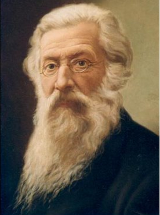U.Porto Memory
University of Porto Famous Alumni
Joaquim Albuquerque
 |
Joaquim Albuquerque 1839-1912 Mathematician, teacher and politician |
Joaquim de Azevedo Sousa Vieira da Silva Albuquerque was born in Porto on 16 August 1839, at Quinta das Virtudes, built in 1767 by his great-grandfather, José Pinto de Azevedo Meireles, and located in the current Rua de Azevedo Albuquerque. He was the son of João de Azevedo de Sousa Vieira da Silva e Albuquerque and Joaquina Carlota Barreto da França.
In 1861, he graduated in Civil Engineering at the Polytechnic Academy of Porto, and started teaching as a high school teacher. However, because of his intellectual merit, he later became the third former student of that Academy to join the faculty of the Academy. Here, he taught the 1st chair – Analytical Geometry in the plane and space, Spherical Trigonometry, Superior Algebra, between 1876 and 1878, and the 2nd chair– Differential and Integral Calculus, of differences and variations, and after 1885, the 3rd chair – Rational mechanics, kinematics.
Joaquim Albuquerque retired in 1910 as he reached the age limit for the position. In 1911, when the University of Porto was founded, he applied for the position of Rector, but only received one vote.
 He was a member of the Porto branch of the Portuguese Geography Society of Lisbon, where he served as 1st secretary. He wrote scientific and school Mathematics books, namely: "Será suficiente o princípio da gravitação universal para a explicação dos fenómenos celestes?"(1876), "Primeiros princípios da teoria dos Determinantes"(1883), "Lições de Mecânica Racional e Cinemática"(1888-1895) and "O Gabinete Cinemático da Academia Politécnica do Porto. Sistema Reulaux"(1893). Joaquim Albuquerque also collaborated with Camilo Castelo Branco in the translation of the Dictionary of Teaching and Education.
He was a member of the Porto branch of the Portuguese Geography Society of Lisbon, where he served as 1st secretary. He wrote scientific and school Mathematics books, namely: "Será suficiente o princípio da gravitação universal para a explicação dos fenómenos celestes?"(1876), "Primeiros princípios da teoria dos Determinantes"(1883), "Lições de Mecânica Racional e Cinemática"(1888-1895) and "O Gabinete Cinemático da Academia Politécnica do Porto. Sistema Reulaux"(1893). Joaquim Albuquerque also collaborated with Camilo Castelo Branco in the translation of the Dictionary of Teaching and Education.
During the 2-year period in which he chaired the Society of Education of Porto (1884-1885), he organised 3 conferences on "A Máquina e o Mundo", to disseminate the new study method of Kinematics, by Franz Reuleaux (1829-1905).
 Joaquim de Azevedo Albuquerque was also seduced by politics. He was a candidate and member during the monarchy. In the 31 January 1891 uprising, his name was associated to the provisional government of Portugal, but he distanced himself from that uprising in a letter dated 2 February sent to the media.
Joaquim de Azevedo Albuquerque was also seduced by politics. He was a candidate and member during the monarchy. In the 31 January 1891 uprising, his name was associated to the provisional government of Portugal, but he distanced himself from that uprising in a letter dated 2 February sent to the media.
In 1892, he entered the Masonry, in the Loja Independência do Porto, under the name of Condorcet. In 1904, he was one of the members of the Municipal Republican Commission of Porto.
He was married to Helena Eulália Gonçalves Pinto and the couple had several children.
He died on 21 January 1912.
(Universidade Digital / Gestão de Informação, 2011)
Last updated: 2016-06-29 Webpage created on: 2025-06-24 17:26:28 Complaint Portal